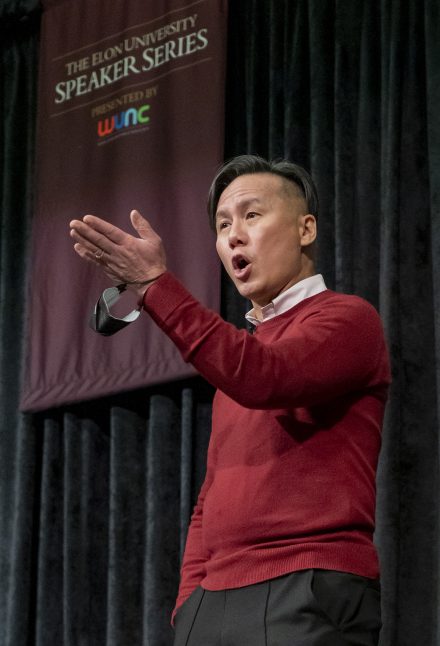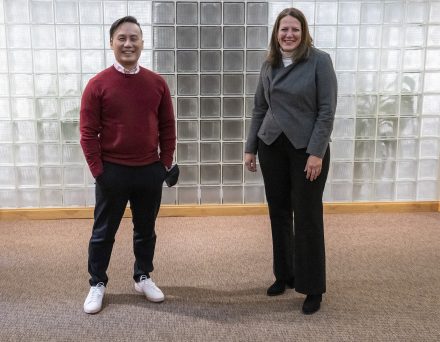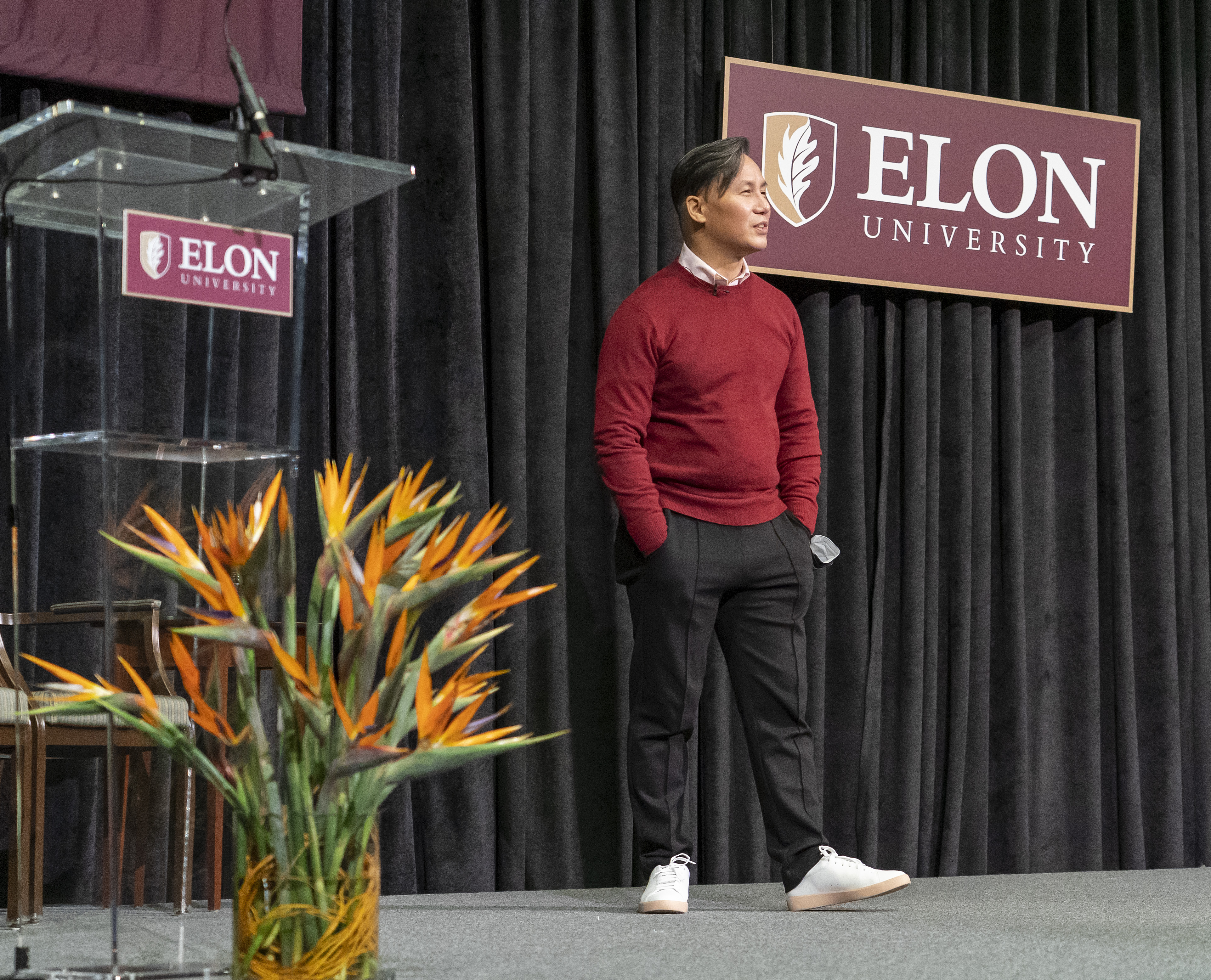Award-winning actor BD Wong delivered the 2022 Martin Luther King Jr. Commemorative Address on Tuesday, Jan. 11, as part of Elon’s annual events held to honor the legacy of the Rev. Dr. Martin Luther King.
Growing up during the civil rights movement in the 1960s, BD Wong was inspired by the discussion of civil rights in America. But as a young Asian American boy who identified early on in his life as gay, Wong often wondered what his place was in a discussion that typically focused on relations between Black and White Americans.
“At the time … I think that people of color that were not Black thought of the Civil Rights [Movement] … like it was for other people,” the award-winning actor said Tuesday night as he delivered the Martin Luther King Jr. Commemorative Address titled “Change, Hope and Equality for Asian Americans.”
“When you were neither White nor Black, you felt somehow outside of the discussion,” Wong added. “Then as my life continued, I feel like that perspective grows and changes and shifts and I am absolutely a participant in all of the many growing and evermore complicated discussions about civil rights, racism and the lack of equality in many different areas.”

Hundreds of students, faculty, staff, Elon community members and visitors from neighboring areas gathered in Alumni Gym to hear about Wong’s journey not only as an actor but as someone coming to accept his Chinese heritage and his identity as a gay man.
The 2022 Martin Luther King Jr. Commemorative Address is part of Elon’s annual events held to honor the legacy of the Rev. Dr. Martin Luther King and is a featured event in the 2021-22 Elon University Speaker Series.
Wong is regarded as one of the country’s most versatile performers, appearing in hits including “Law & Order: SVU,” “Oz,” “Mr. Robot,” “Gotham,” “Jurassic Park” and “Jurassic World” during an entertainment career that stretches back more than two decades.
His Broadway debut in “M. Butterfly” earned him a Tony Award, an Outer Critic’s Circle Award, a Theatre World Award, a Clarence Derwent Award and a Drama Desk Award as he became the only actor to ever win all five major New York theater awards for a single role.
Wong has appeared in more than 20 films, including notable roles in both “Father of the Bride” movies, “Seven Years in Tibet,” Disney’s “Mulan” and the HBO adaptation of “The Normal Heart.” He has starred in the widely celebrated revival of the musical “You’re a Good Man, Charlie Brown” and Stephen Sondheim’s “Pacific Overtures.”
A San Francisco native, Wong detailed to the crowd in Alumni Gym the contrast between his upbringing and that of his older brother and parents. His parents “walked a tightrope” growing up both listening to Elvis Presley with their American classmates and going home to a strict Chinese environment where no English was spoken.

Wong was born nine years after his older brother, who went to Chinese school and experienced “a version of the Chinese life” of their parents. But when Wong and his younger brother were born, his family moved from North Beach, just outside of San Francisco’s Chinatown, to a development in the Sunset District.
“Just by that happening, our sense of what the tightrope was became kind of diluted,” Wong said. “My parents didn’t make us go to Chinese school because it wasn’t as practical to take us, and we were thrilled about this. I was warned that I would regret it and in fact, I do.”
But his parents did ensure that he would be exposed to some of his Chinese culture by making him attend a youth group at the Chinatown YMCA. Although he despised it at the time, he is thankful to his parents for making him do that.
“I observe now with great reverence the way they negotiated these cultures and the way they inspired my life by introducing me to both cultures simultaneously. At the time, I could never appreciate what was happening,” he said.
In high school, Wong delved deeply into acting and credits a high school acting teacher for empowering him to not squander his potential. The teacher allowed him to play non-Asian roles when he was in high school, but he was met with a different experience once he went to college.
“All they saw was the color of my skin or ‘my limitations,’ that they perceived,” Wong said.
Eventually, Wong made his way to New York to become an actor and worked his way up to more prominent roles. He described a lot of the roles he took as “embarrassing” and negatively portraying Asian Americans.
It wasn’t until getting the script for David Henry Hwang’s play “M. Butterfly” that Wong felt that he could become a “vessel for the writer’s vision.” It was the first play he had received at the Broadway level and the first script he’d received from an Asian playwright.
“All of a sudden, I understood through David’s writing what it could be like to be a messenger for someone’s vision, for someone’s thoughts. He wrote about so many things about stereotyping, about his perspective as an Asian American man in a culture that treats Asian American men a certain way,” Wong said.
He went into the audition fully expecting to get passed over for the role, but also hoping for the chance to introduce himself to one of the top writers on Broadway. But he was tapped for the role, it marked the beginning of a new chapter in his life.
“That was the beginning of a lot of doors opening for me. And more than that, it was the beginning of the door opening on my own self-esteem as an Asian American,” Wong said. “Because I appreciated all of a sudden the value, the beauty, the joy, the pride and anything about being Asian American that really was lost to me before that.”
Despite a newfound pride in his Asian American culture, he still wasn’t comfortable discussing his sexuality.
“I was never what I call ‘deeply in the closet,’ he said. “I came out to my parents … but I couldn’t quite embrace it. I was always kind of hedging it and I could feel what I realized now was a sense of discomfort.”
It was a personal tragedy in his road to parenthood that led him to be more open. In 2000, Wong and his former partner had twin sons. They were born three months prematurely and one of the sons passed away. Wong said his way to cope with this difficult time were emails he would send to his support group. Those emails turned into a book about the highs and lows he and his former partner endured during that time, “Following Foo: The Electronic Adventures of the Chestnut Man.”

“This is kind of the opportunity that I’ve been looking for is to come out publicly. I felt very similarly to the way I did when ‘M. Butterfly’ opened, and I was free of all my shame being Asian American,” Wong said. “I was lucky in these two contexts that I had something that fed my sense of joy that allowed me to see the beauty in what I was.”
Throughout his career, he has stood up against typecasting and racism in the entertainment industry and has been praised for addressing issues including racial self-image, Asian-American parental pressure and the “model-minority myth.”
He is an active board member of Rosie’s Theater Kids, which has helped over 20,000 students get access to free arts education, as well as an advocate for the Asian American Legal Defense and Education Fund. Wong said that he is a “humble participant” when speaking for a lecture in honor of Dr. King.
“I’m extremely grateful for these things that have happened to me. And to bring it all around, I am extremely happy that it can be framed even remotely in terms of commemoration for Martin Luther King Jr.,” Wong said.
Learn more here about other events at Elon celebrating the life and legacy of Martin Luther King Jr. this month.



